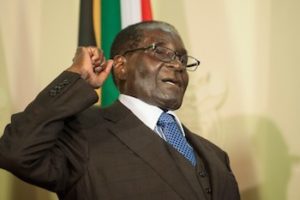
Robert Mugabe
Robert Mugabe was born on this date in 1924. He was a Black African politician, revolutionary leader, and president of Zimbabwe.
From the Kutama Mission in Zvimba in what is now northwestern Zimbabwe, Mugabe taught at the mission school between 1941 and 1943. After several other brief teaching jobs around Zimbabwe (then Southern Rhodesia), Mugabe won a scholarship to the University of Fort Hare College in South Africa. There, he was introduced to the literature on Communism, Marxism, and Gandhian passive resistance. After completing his bachelor's degree, he returned to Zimbabwe to teach, then taught in Northern Rhodesia (now Zambia) and later in Ghana. In 1960, Mugabe returned home to enter politics.
He first joined the nationalist group the Zimbabwe African People's Union (ZAPU). In 1964, after several arrests and a falling-out with its leadership, Mugabe went to Tanzania and joined the newly formed Zimbabwe African National Union (ZANU). ZANU inaugurated the war for independence that same year. On returning to Southern Rhodesia, Mugabe was again arrested and spent most of the next decade in prison, earning bachelor's degrees in law and administration while incarcerated.
In prison, ZANU members elected Mugabe to replace Ndabaningi Sithole as party head. His position as party head was contested until 1976 when the military wing of ZANU recognized him as a leader. After four more years of war, Mugabe and ZAPU leader Joshua Nkomo entered negotiations with the Rhodesians, concluding with Zimbabwe's independence in April 1980. Mugabe and ZANU won by a landslide in elections just before independence, and he became prime minister.
After independence, Mugabe proved to be a highly pragmatic leader. After the war, he called for reconciliation and cared not to offend Western governments or the white community of Zimbabwe, whose skills and wealth the country needed. Although he has often espoused socialism, he has maintained an essentially free-market economy. At the same time, Mugabe has consolidated his power. He put considerable pressure on Nkomo and the ZAPU party until 1987, when they agreed to join ZANU, creating the ZANU-Patriotic Front (ZANU-PF). With the creation of an executive presidency the same year, opposition, official or otherwise, effectively ended.
In elections in 1990, Mugabe won 78 percent of the popular vote. ZANU-PF has remained the de facto ruling party, typically winning only a handful of parliamentary seats. Elitism and cronyism have become the norm in Mugabe's government. In February 2002, voters rejected a new constitution that entrenched Mugabe's autocratic control. Enraged at such a show of opposition, he encouraged the war veterans to invade white-owned farms and stake the white colonialists who had stolen their claim to the land. The veterans marched onto 1,500 farms, threatening the farmers and assaulting their black workers.
Mugabe's land-grabbing crippled Zimbabwe's commercial agriculture industry, dominated by 4,500 mainly white farmers, which in the past made up some 20% of the country's GDP and 40% of its export earnings. However, a general election in June brought another shock for Mugabe. In a poll marred by intimidation and violence in which 31 people died, including five white farmers, an opposition party took close to half the elected seats in the Harare parliament.
Despite the setback, Mugabe continued his land-grab policy to gain rural support for the 2002 presidential election. He told judges who have ruled that the government's land acquisitions are unlawful and no longer needed. He ignored pleas from the international community and other African leaders, including Nigeria's Olusegun Obasanjo and South Africa's Thabo Mbeki, to respect the rule of law.
As a politician, Robert Mugabe remained at the top. He wished to go down in history as the man who gave African land back to Africans, even if it meant other problems for his country. A segment on the television program 60 Minutes (aired on August 18, 2002) confirmed the tyranny in Zimbabwe. It was estimated that 600,000 people would starve because of the circumstances under Robert Mugabe at that time.
In 2017, the Zimbabwe African National Union-Patriotic Front (ZANU-PF) convened to bring together nearly 6,000 officials from all party levels. The congress followed the military intervention in Zimbabwe, forcing President Robert Mugabe’s resignation after 37 years in power.
An educator by trade and a politician by practice, Mugabe was the preeminent political leader in Zimbabwe for nearly two decades. Robert Mugabe, the Zimbabwean independence icon turned authoritarian leader, died on September 5, 2019, at age 95. Mugabe had been receiving treatment in a hospital in Singapore since April of that year.